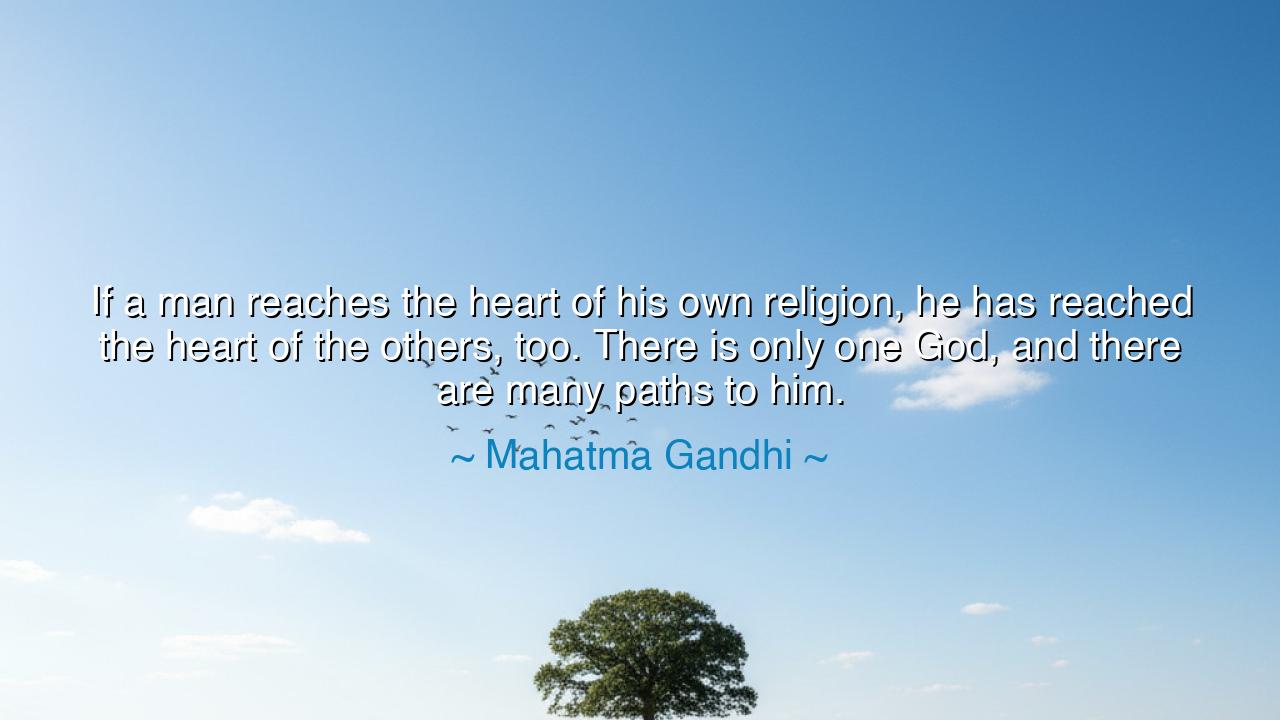
If a man reaches the heart of his own religion, he has reached
If a man reaches the heart of his own religion, he has reached the heart of the others, too. There is only one God, and there are many paths to him.






"If a man reaches the heart of his own religion, he has reached the heart of the others, too. There is only one God, and there are many paths to him." – Mahatma Gandhi.
In this profound statement, Mahatma Gandhi speaks to the universal truth that underlies all religions: that at their core, they are all seeking the same divine presence. Gandhi suggests that when an individual delves deeply into the essence of their own faith, beyond the rituals and dogmas, they discover the common spiritual truth that connects all people, regardless of their religious affiliation. To truly understand one's own religion is to understand the heart of all other faiths, for all paths, though varied in their expressions, lead to the same ultimate reality—God. Gandhi’s wisdom challenges us to move beyond divisions and to see the unity that exists at the core of all spiritual practices.
The ancient philosophers often recognized the unity of truth found in various teachings. Plato, in his work The Republic, discussed the idea of the Forms, which he believed were universal and unchanging truths that existed beyond the physical world. These forms, although expressed differently across cultures and belief systems, were accessible to those who sought wisdom and understanding. For Plato, the search for truth was not confined to a single path; it was something that could be discovered through reason, dialogue, and deep spiritual reflection. Like Gandhi, Plato recognized that all philosophical paths that sought wisdom would ultimately lead to the same underlying truths about existence, the divine, and human nature.
In the same vein, the Stoics—such as Epictetus and Marcus Aurelius—believed that true virtue and the path to peace lay in the recognition of the universal law that governs the cosmos. Marcus Aurelius famously wrote, “What is not good for the hive, cannot be good for the bee,” suggesting that individual well-being is deeply intertwined with the well-being of the community and the world. The Stoics, much like Gandhi, held that wisdom transcends particular religious beliefs and can be found in the universal principles that govern all human actions. Thus, when one seeks to understand their own place in the world and the truth of their own existence, they inherently find themselves aligned with the truth found in other systems of thought and faith.
Consider the story of Mahatma Gandhi himself, a man whose life was a testament to this idea of unity in diversity. Gandhi’s journey was not one of blind adherence to a particular religious tradition; rather, it was a quest to live the principles of truth and non-violence that lay at the heart of his spiritual understanding. Though born into the Hindu tradition, Gandhi was profoundly influenced by the teachings of Christ, the Jain philosophy, and the Islamic faith. He saw God not as confined to a particular religion, but as a universal presence that transcended cultural and doctrinal differences. Gandhi believed that through personal practice—whether through the Hindu ideal of Ahimsa (non-violence) or Christ’s teachings of love—one could access the divine truth that unites all people, regardless of their religious affiliations.
Gandhi's personal belief in the unity of religions is most poignantly illustrated in his actions during India’s struggle for independence. As he sought to unite people of all faiths—Hindus, Muslims, Sikhs, Christians, and others—he embraced the belief that, while their practices and customs may differ, they were all connected in their shared pursuit of spiritual truth. His non-violent movement was built on the premise that by recognizing the oneness of all people, regardless of their background, India could create a society rooted in peace and justice. Gandhi’s personal belief system was one of radical inclusivity, rooted in the idea that at the heart of every religion was a shared moral compass pointing toward universal truth and divine love.
The lesson from Gandhi’s words is clear: true spirituality is not defined by the outer forms of religious practice or belief, but by the heart of each tradition. When we look deeply into our own faith—beyond the rituals and doctrines—we discover that all religions seek the same truth: the connection to the divine and the cultivation of compassion, love, and peace. The diversity of religious practices is not a cause for division, but an opportunity to celebrate the many paths to the same ultimate goal—spiritual awakening and a life lived in harmony with all beings.
In our own lives, we are called to examine our beliefs not through the lens of division but through the lens of connection. We must seek the universal principles that exist within our own faiths and in the faiths of others. Let us strive to live in a way that honors the common threads of humanity that unite us all. Whether we find meaning through prayer, meditation, or acts of service, we can draw strength from the shared values that underpin every path to the divine. In doing so, we not only enrich our own spiritual journey but also foster peace and unity in a world that is often divided by religious differences. There is only one God, and through a life of truth, love, and service, we will find our way to Him, no matter the path we walk.






AAdministratorAdministrator
Welcome, honored guests. Please leave a comment, we will respond soon